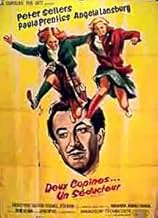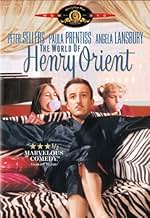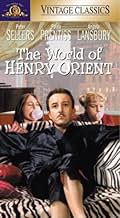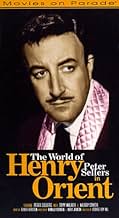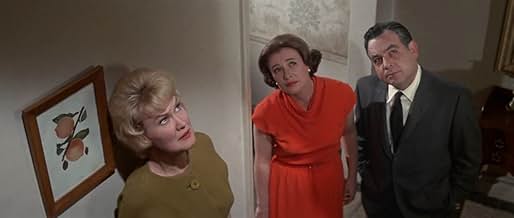A mischievous, adventuresome fourteen-year-old girl and her best friend begin following an eccentric concert pianist around New York City after she develops a crush on him.A mischievous, adventuresome fourteen-year-old girl and her best friend begin following an eccentric concert pianist around New York City after she develops a crush on him.A mischievous, adventuresome fourteen-year-old girl and her best friend begin following an eccentric concert pianist around New York City after she develops a crush on him.
- Awards
- 1 win & 3 nominations
- Doorman
- (as Jerry Jerrett)
Storyline
Did you know
- TriviaThe character of Henry Orient was inspired by real-life concert pianist Oscar Levant. Nora Johnson, who wrote the novel on which the movie was based (and co-wrote the screenplay with her father, Nunnally Johnson), said that she and a friend had a crush on Levant when they were schoolgirls.
- GoofsDuring his concert, Henry's hair changes back and forth from neat to messed up.
- Quotes
[Val induces a fantasy about Gil's divorced parents]
Val Boyd: Think your Dad will ever come back?
Marian Gilbert: Why can he? He's married and has a couple of kids.
Val Boyd: But how do you know he's happy?
Marian Gilbert: He's crazy about her.
Val Boyd: I know, but just suppose he suddenly realized his second marriage was a tragic mistake. His eyes are opened at last, and he knows now that your mother is the only woman he's ever loved in his whole life.
Marian Gilbert: I don't think there's much chance of that.
Val Boyd: So there's nothing to do but tell her the truth... the scond wife I mean. He's simply got to go back to the only woman he's loved in his whole life. Good-bye, second wife.
Marian Gilbert: You think that's really possible?
Val Boyd: Well, he's got no other choice. He can't go living a lie, can he? He's got to go back to his one true love.
Marian Gilbert: Maybe, during Christmas.
Val Boyd: Chirstmas Eve maybe.
Marian Gilbert: About 6:00.
Val Boyd: You and your mother are all alone trimming the tree, when suddenly the doorbell rings.
Marian Gilbert: I'd be the one to go and answer it.
Val Boyd: But you'd be wondering 'who on earth it could be,' because you weren't expectign anyone. He'd open the door, and he'd be standig there simply loaded with presents. And before you could say anything, he'd say, 'Shhhh,' because he wants to surprise your mother. At first, he'd give you a big hugh, just as tight as he could.
Marian Gilbert: And them Mom would come down wondering who it was, beause she'd be wondering why she didn't hear anybody say anything.
Val Boyd: And for a long time, they'd just stand there and stare at each other not saying anything.
Marian Gilbert: They wouldn't have to.
Val Boyd: [sighing mid-sentence] And then he'd take her in his arms, and rain kisses on her upturned face, and they'd just... love each other to death right there at the front door.
- Crazy creditsintroducing MERRIE SPAETH as "Gil" TIPPY WALKER as "Val"
- ConnectionsFeatured in Hollywood: The Gift of Laughter (1982)
- SoundtracksHenry Orient Concerto
Music by Ken Lauber (as Kenneth Lauber)
Conducted and orchestrated by Ken Lauber (uncredited)
Sellers has the title role as Henry Orient, a pianist more interested in practicing his lines than his scales, but the film's focus is on a lonely young Manhattanite named Gil (Merrie Spaeth) and her new pal Val (Elizabeth "Tippy" Walker), two adolescents who decide to make Val's crush on Orient into the secret center of an adventure-filled friendship.
"Henry Orient" is a film of two parts co-existing uneasily at times. Val and Gil's bond occupies the realm of real life, with Walker and Spaeth giving spot-on performances that seem spontaneous and alive to every moment. The best scene in the movie by far, very much in line with the "Can't Buy Me Love" sequence in the same year's "Hard Day's Night," shows the pair running along a city block, "splitzing" over fire hydrants and tryke-riding boys, their eyes alight with joy as they literally rise over their city surroundings. It's a captivating exercise in what scholars would call "pure cinema." If the rest of the film doesn't rise to that level, it never entirely disappoints, either.
Sellers' sequences are weaker. He's actually quite enjoyable to watch, doing one of his best voice performances as a Brooklynite who affects a French-Italian accent to charm the ladies (listen carefully and you will hear his Brooklyn undertone throughout) but he and Paula Prentiss as the married object of his desires seem to be in a completely different movie, playing a broad farce at odds with the real, sometimes gut-wrenching tone of the rest of the film.
This could be a bigger problem but for Elmer Bernstein's lilting yet driving score, featuring one of the most arresting themes I've heard in film, which seems to carry Val and Gil from one delirious moment to the next with complete abandon while allowing room for darker, contemplative passages. Director George Roy Hill had a gift for employing music at the right moment (see "The Sting"), and the score of "Henry Orient" is a secret strength as it skates over the thinner plot elements.
More obviously a strength is the script by Nora and Nunnelly Johnson, which really captures a sense of how young people talk, goofily, quickly and all-at-once, skipping over the stuff that doesn't matter, like when Val and Gil first meet at their ritzy school. Val asks Gil if she likes being there.
Gil tries to be diplomatic: "They say it's the finest girls' school in the country." "I don't, either," says Val.
Or the priceless exchange they have when taking out a cigarette butt they cadged off of Orient's table during a midday stalk. "No filter!" "He's not scared." One wishes the film found more to draw Orient and his youthful admirers together, though the detour into the state of Val's parental relations has merits of its own, especially with Angela Lansbury doing another of her classic nasty-Mommy turns.
While it didn't set the world on fire in 1964 and, like its young stars, slipped off the radar screen too soon after its premiere, "Henry Orient" remains an engaging glimpse at American youth post-Salinger but pre-Beatles. Sidewalk placards still advertise color TV, while a rich girl's idea of rebellious fashion sense involves wearing a plaid skirt with a mink coat. Trends come and go, but feelings of the kind celebrated in "The World Of Henry Orient" live on.
- How long is The World of Henry Orient?Powered by Alexa
Details
- Release date
- Country of origin
- Languages
- Also known as
- Henrys Liebesleben
- Filming locations
- The Brearly School, 610 E. 83rd Street, New York City, New York, USA(School bus drop-off at end of opening credits)
- Production company
- See more company credits at IMDbPro
- Runtime1 hour 46 minutes
- Color
- Aspect ratio
- 2.35 : 1
Contribute to this page




